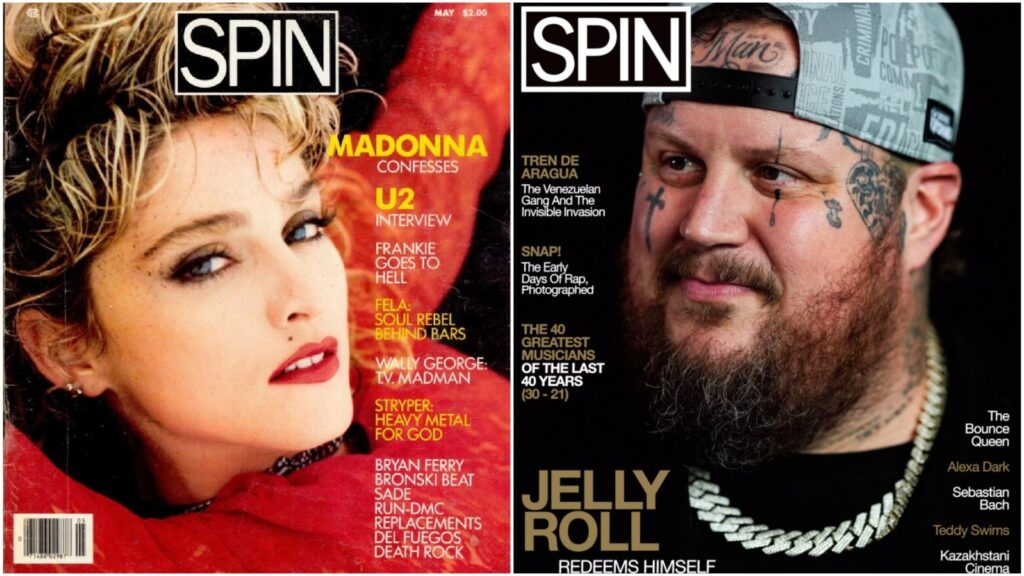It was supposed to be a new chapter for Spin magazine — and it sounded, at least in terms of the diminished expectations of the current media landscape, like a theoretically decent one, too.
Next Management Partners, the Santa Monica-based venture capital firm that owns the Bob Guccione Jr.-edited magazine brand, had a deal in place to sell the publisher to the Dennis Cunningham-run Airtab, a Florida-based events platform that connects bookers with local artists. Talks had been ongoing for the past eight months, both sides had incurred about six-figures on legal bills hammering out the details, a major concert had been planned and a 1,200-word embargoed deal announcement was ready to go.
In the lead up, the would-be new owner, Airtab’s Cunningham, told The Hollywood Reporter that new ownership would take the quarterly magazine to a monthly cadence, bump up its circulation to 150,000-200,000 copies, increase the full-time, mostly remote staff of 8 employees by 25 percent over the next year, bolster editorial coverage with a more local focus and turbocharge the events business with a series of high-profile live shows, including one timed to the magazine’s 40th anniversary at the 65,000-seat Hard Rock Stadium in Miami this December.
All of that sounded interesting, in the sense that it’s a specific direction for the media brand. Not to mention it’s a relatively rare media growth plan. In a conversation with Cunningham, it wasn’t as clear how the Airtab app — which makes money in part through taking a cut from connecting, say, a local bar owner with an artist looking to gig — would integrate with Spin or take its branding. (Though the idea of merging a well-known news brand with an events platform sounds plausible enough as a bet on what the next iteration of digital media looks like.)
But it’s beside the point. The wire transfer to seal the deal never went through, Spin CEO Jimmy Hutcheson says, a move that confounded the management team at the publisher as the window to close expired. Airtab’s Cunningham acknowledged the deadline for the deal, describing his company’s team as being cautious and needing to “confirm a few things” but that his desire is still to come to terms on closing the sale. Spin staffers were informed of the deal falling through on Tuesday.
Hutcheson describes the situation to THR as baffling, given the sign offs of all of the Next Management Partners’ investors on the deal, the monthslong process to closing, that Airtab had initiated the process of an acquisition and that, the exec claims, Airtab showed up to the deal close without sending cash (aside from a legal deposit). The Spin CEO says the brand wasn’t even for sale at the time of the initial overture. Now, however, Hutcheson notes that the company will look to “evaluate opportunities, if the right qualified buyer comes along.”
The move is the latest turn for one of the last standing mainstream U.S. music magazines. Next Management is the third owner for Spin over the past decade. It was part of the very-2010s named BuzzMedia, which grouped it with Stereogum, Hype Machine and Idolator, for a time. And Spin had worked the past five years since its acquisition from the then-named Billboard–Hollywood Reporter Media Group in 2020 to diversify its revenue away from reliance on programmatic advertising given the volatile dollars-turning-into-dimes aspect of the digital ad market. (As of now Spin has about 1.6 million unique visitors on Comscore in July, in the same ballpark as an old rival, the Condé Nast-owned music reviews authority Pitchfork, at 2.3 million.)
A lot of the value in Spin, like most media brands now, is in the name itself, as long as it still carries editorial credibility on the magazine side. Its venture capital parent inked a deal to launch a Spin Records imprint at Virgin, it announced a development deal with Yellowstone banner 101 Studios to mine its four decades worth of archives for movie and TV ideas (although nothing has yet come of that) and licensed Spin-branded retro shirts to outlets like Urban Outfitters. The figure that Hutcheson gave is that Spin has grown its revenue during its Next Management tenure by 17x by looking for deals in licensing and branding opportunities.
Last August, Spin relaunched its white-and-black logo with its print magazine as a quarterly publication with Guccione Jr. at the helm for the first time since he sold the brand in 1997. (Pitchfork, too, has experimented with a print product this year, unveiling a small-run zine on Swedish rapper Bladee as a collectible edition). “Spin has been about irreverence and maybe finding artists first,” Hutcheson says, adding that it was the first major U.S. magazine to put Nirvana on a cover (October ’93, below, the same month that now-defunct U.K. magazine Q featured Kurt Cobain on the cover). The relaunched quarterly version of Spin kicked off with country music’s Lainey Wilson on the cover last August, and its most recent print edition in June featured rapper-singer Jelly Roll.
Now, as publishers are deemphasizing web traffic as the be-all-end-all metric, the bet is on leveraging that legacy editorial for other opportunities. “The world has changed a lot, if you rely on just trying to grow your Comscore number that’s not the best strategy even in digital now,” Hutcheson notes. “I see that being only one piece of a much bigger puzzle. Where the action is, it’s in ticketed events that are branded Spin.”

Spin‘s October 1993 cover of Nirvana.
Google Books

Spin‘s July 2007 cover featuring Amy Winehouse.
Google Books

Spin‘s April 2011 cover featuring The Strokes.
Google Books

